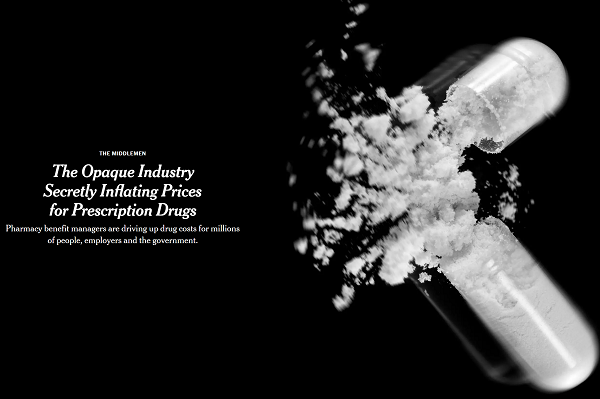The Opaque Industry Secretly Inflating Prices for Prescription Drugs
By Rebecca Robbins and Reed Abelson
June 21, 2024
 Americans are paying too much for prescription drugs.
Americans are paying too much for prescription drugs.
It is a common, longstanding complaint. And the culprits seem obvious: Drug companies. Insurers. A dysfunctional federal government.
But there is another collection of powerful forces that often escape attention, because they operate in the bowels of the health care system and cloak themselves in such opacity and complexity that many people don’t even realize they exist.
They are called pharmacy benefit managers. And they are driving up drug costs for millions of people, employers and the government.
The three largest pharmacy benefit managers, or P.B.M.s, act as middlemen overseeing prescriptions for more than 200 million Americans. They are owned by huge health care conglomerates — CVS Health, Cigna and UnitedHealth Group — and are hired by employers and governments.
The job of the P.B.M.s is to reduce drug costs. Instead, they frequently do the opposite. They steer patients toward pricier drugs, charge steep markups on what would otherwise be inexpensive medicines and extract billions of dollars in hidden fees, a New York Times investigation found.
Most Americans get their health insurance through a government program like Medicare or through an employer, which pay for two different types of insurance for each person. One type covers visits to doctors and hospitals, and it is handled by an insurance company. The other pays for prescriptions. That is overseen by a P.B.M.
The P.B.M. negotiates with drug companies, pays pharmacies and helps decide which drugs patients can get at what price. In theory, everyone saves money.
“We’re really, really good at what we do,” Jon Mahrt, president of UnitedHealth’s P.B.M., Optum Rx, said in an interview. The main lobbying group for the P.B.M.s says that in 2022 they saved their clients and patients $286 billion.
But those savings appear to be largely a mirage, a product of a system where prices have been artificially inflated so that major P.B.M.s and drug companies can boost their profits while taking credit for reducing prices.
The Times interviewed more than 300 current and former P.B.M. employees, patients, physicians, pharmacists and other industry experts, and reviewed court documents and patient records. The investigation found that the largest P.B.M.s often act in their own financial interests, at the expense of their clients and patients. Among the findings:
- P.B.M.s sometimes push patients toward drugs with higher out-of-pocket costs, shunning cheaper alternatives.
- They often charge employers and government programs like Medicare multiple times the wholesale price of a drug, keeping most of the difference for themselves. That overcharging goes far beyond the markups that pharmacies, like other retailers, typically tack on when they sell products.
- The largest P.B.M.s recently established subsidiaries that harvest billions of dollars in fees from drug companies, money that flows straight to their bottom line and does nothing to reduce health care costs.
- The P.B.M.s, which are responsible for paying pharmacies on behalf of employers, are driving independent drugstores out of business by not paying them enough to cover their costs. Small pharmacies have little choice but to accept these lowball rates because the largest P.B.M.s control an overwhelming majority of prescriptions. The disappearance of local pharmacies limits health care access for poorer communities but ultimately enriches the P.B.M.s’ parent companies, which own drugstores or mail-order pharmacies.
- P.B.M.s sometimes delay or even prevent patients from getting their prescriptions. In the worst cases, patients suffer serious health consequences.
Many patients learn about the existence of P.B.M.s only when they have a problem getting medications and spend hours navigating a byzantine system of approvals and restrictions.
But the P.B.M.s’ business practices touch virtually every American family. Even people who don’t take prescription drugs end up paying higher insurance premiums and taxes as a result of inflated drug costs.
In Oklahoma, for example, CVS’s P.B.M., Caremark, overcharged the health plan for state employees by more than $120,000 a year for one patient’s cancer drug, according to his insurance documents.
In Illinois, a woman with cancer paid hundreds of dollars more than she should have for her pain medication because Caremark required her to use a more expensive version.
In New Jersey, Cigna’s P.B.M., Express Scripts, wanted Joseph Kaplan, a 77-year-old retiree, to pay $211 for a three-month supply of his allergy drug when he could have paid $22 at Costco. “It’s just nuts,” he said.
Smallish sums quickly add up when applied across the health care system. It is a big reason the P.B.M.s have become a…
[READ THE COMPLETE ARTICLE HERE]
